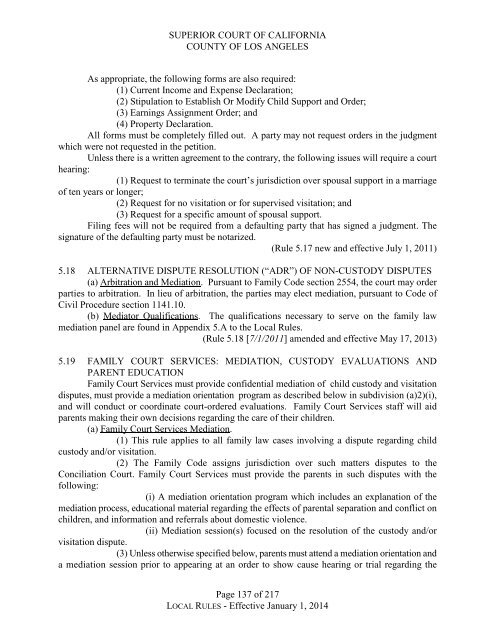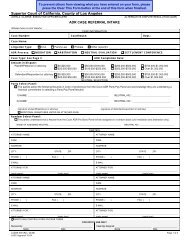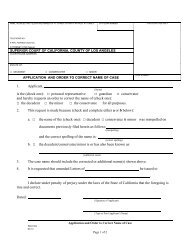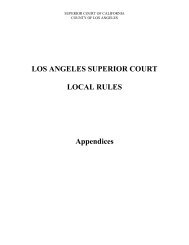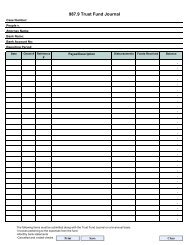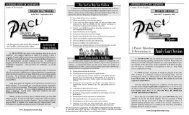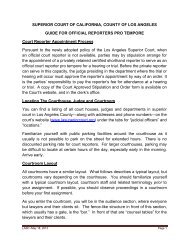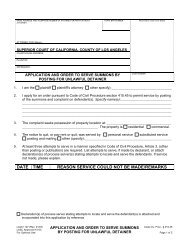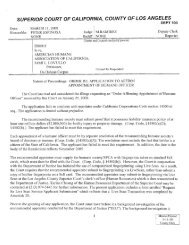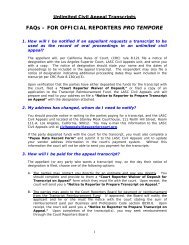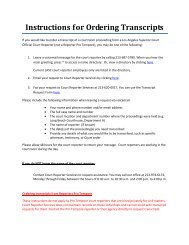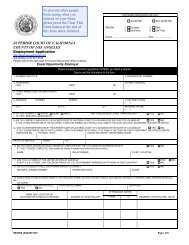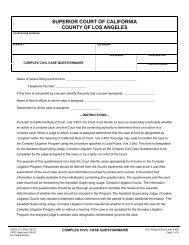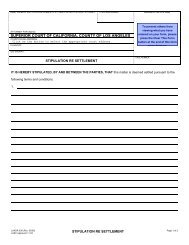Chapter five family division rules - Superior Court of California ...
Chapter five family division rules - Superior Court of California ...
Chapter five family division rules - Superior Court of California ...
- No tags were found...
Create successful ePaper yourself
Turn your PDF publications into a flip-book with our unique Google optimized e-Paper software.
SUPERIOR COURT OF CALIFORNIACOUNTY OF LOS ANGELESAs appropriate, the following forms are also required:(1) Current Income and Expense Declaration;(2) Stipulation to Establish Or Modify Child Support and Order;(3) Earnings Assignment Order; and(4) Property Declaration.All forms must be completely filled out. A party may not request orders in the judgmentwhich were not requested in the petition.Unless there is a written agreement to the contrary, the following issues will require a courthearing:(1) Request to terminate the court’s jurisdiction over spousal support in a marriage<strong>of</strong> ten years or longer;(2) Request for no visitation or for supervised visitation; and(3) Request for a specific amount <strong>of</strong> spousal support.Filing fees will not be required from a defaulting party that has signed a judgment. Thesignature <strong>of</strong> the defaulting party must be notarized.(Rule 5.17 new and effective July 1, 2011)5.18 ALTERNATIVE DISPUTE RESOLUTION (“ADR”) OF NON-CUSTODY DISPUTES(a) Arbitration and Mediation. Pursuant to Family Code section 2554, the court may orderparties to arbitration. In lieu <strong>of</strong> arbitration, the parties may elect mediation, pursuant to Code <strong>of</strong>Civil Procedure section 1141.10.(b) Mediator Qualifications. The qualifications necessary to serve on the <strong>family</strong> lawmediation panel are found in Appendix 5.A to the Local Rules.(Rule 5.18 [7/1/2011] amended and effective May 17, 2013)5.19 FAMILY COURT SERVICES: MEDIATION, CUSTODY EVALUATIONS ANDPARENT EDUCATIONFamily <strong>Court</strong> Services must provide confidential mediation <strong>of</strong> child custody and visitationdisputes, must provide a mediation orientation program as described below in sub<strong>division</strong> (a)2)(i),and will conduct or coordinate court-ordered evaluations. Family <strong>Court</strong> Services staff will aidparents making their own decisions regarding the care <strong>of</strong> their children.(a) Family <strong>Court</strong> Services Mediation.(1) This rule applies to all <strong>family</strong> law cases involving a dispute regarding childcustody and/or visitation.(2) The Family Code assigns jurisdiction over such matters disputes to theConciliation <strong>Court</strong>. Family <strong>Court</strong> Services must provide the parents in such disputes with thefollowing:(i) A mediation orientation program which includes an explanation <strong>of</strong> themediation process, educational material regarding the effects <strong>of</strong> parental separation and conflict onchildren, and information and referrals about domestic violence.(ii) Mediation session(s) focused on the resolution <strong>of</strong> the custody and/orvisitation dispute.(3) Unless otherwise specified below, parents must attend a mediation orientation anda mediation session prior to appearing at an order to show cause hearing or trial regarding thePage 137 <strong>of</strong> 217LOCAL RULES - Effective January 1, 2014


